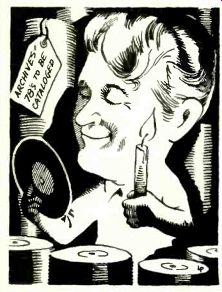
Contributing Editor, David Hall
Since readers from time to time understandably display a natural human curiosity about the backgrounds of the writers and editors who bend their ears each month in these pages, we will be offering, in issues to come, a series of capsule biographies and autobiographies designed to satisfy that ex pressed need and at the same time to circumvent some of the hazards of mere speculation.
- Ed.
I WAS born in 1916, by happy coincidence on the same day of the month as Ludwig van Beethoven. Whether or not this accounts for my lifelong interest in music I couldn't say; by the time I was attending school (Exeter), however, this interest was in full bloom. In fact, I had by then (that was back in 1932) already fashioned my first "hi-fi" rig complete with a two-speed turntable on which I was able to play early RCA long-playing records, including Stokowski and the Philadelphia doing the Beethoven Fifth, that were never issued on 78's! Even later at Yale (1935-1939), although I nominally majored in psychology, I spent every spare moment at the music school as an enthusiastic amateur. So, after a year of graduate work at Columbia effectively turned off any desire for a professional academic career, I took a dare from Norman Cousins, who had just assumed the editor ship of the Saturday Review, and concocted The Record Book, the very first full-scale layman's guide to recorded music up to that time. (B. H. Haggin's very selective Music on Records preceded it, and Irving Kolodin's Guide to Recorded Music followed it by a few months.) Later, after a rugged apprenticeship at Columbia Records' Bridge port headquarters, I eventually wound up, in 1941, doing full-time concert-music scripting at NBC, and gained, in the bargain, a truly intensive kind of musical education as a result of sitting in on six or so years of Toscanini/NBC Symphony rehearsals.
Those who can't, teach, as the old saw, with simplistic inaccuracy, has it, and after my NBC tenure came the opportunity to join Mercury Records as a record producer- a kind of teaching. It was a rocky time in the record industry (the "battle of the speeds," and all that), but by 1951, with the encouragement of the front office and the collaborative genius of C. R. Fine (he and I heard ear-to-ear on the use of single-micro phone pickup for symphony-orchestra re cording), the Mercury "Living Presence" series got under way. After a few trial runs, we went for broke with the Chicago Sym phony under Kubelik (the famous Pictures at an Exhibition), and then launched extensive series with Dorati and the Minneapolis, Howard Hanson and the Eastman Rochester, and the Detroit under Paul Paray. Perhaps our most famous undertaking was the first recording of the 1812 Overture complete with real cannons, churchbells--the works--back in 1954-1955.
A year's interlude, by virtue of a Fulbright grant, came in 1956. My artist wife and four children packed up and accompanied me to Copenhagen, where I worked with the American Scandinavian Foundation, whose music center did much of the spadework for the belated U.S. recognition of Carl Nielsen and other post-Grieg Scandinavian composers. Upon return to the States, through a combination of damn-fool luck and help-from-the-powers-that-were, I wound up on the founding editorial staff of a fledgling music magazine, known today to all and sundry as STEREO REVIEW, settling in as Music Editor (rather tentatively at first, I must confess, though there was a measure of improvement with age and experience).
Mid-1962 marked my exit from full-time magazine work, and from 1963 to 1966 I was president, on a part-time basis, of CR I Records. Then, in 1967, I fulfilled one of my most long-cherished ambitions: I became head of the Rodgers and Hammerstein Archives of the New York Public Library's recorded-sound research facility at Lincoln Center, a dream I had nurtured since the late Forties, when I was invited to prepare the initial draft for a prospectus encompassing just such an archive.
Other current activities? Well, I'm still writing for STEREO REVIEW, of course, and my spouse Bernice, who has enjoyed her own career as art teacher and artist, is at the moment chairwoman of art for the New Canaan school system. Our four children are enjoying their own careers as well--they're all married but one, and all are involved in teaching, social work, art, and music in varying degrees. Our summers have been spent, since 1962, in Castine, Maine, where sailing and beachcombing have been major forms of recreation. Music hath its charms, but so, after all, do nature's delights, a full family life, and con genial sociability.
-D.H.
==============
Also see:
HOW TO MAKE GOOD RECORDS--The quality problem illumined by a look at manufacturing processes, JOHN BITTNER, JR.